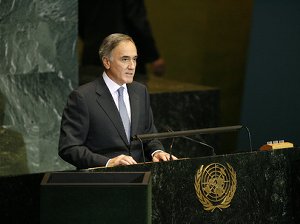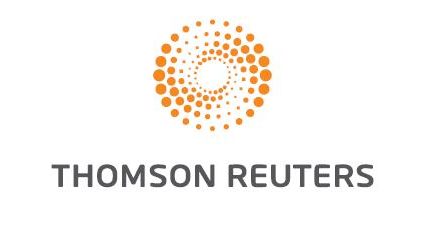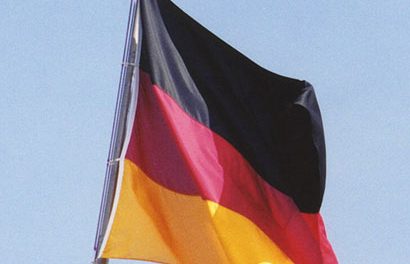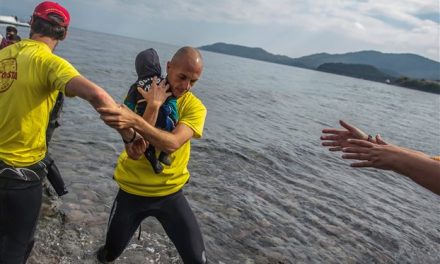Τη σημασία που αποδίδει η Ελλάδα στο ρόλο των εκπροσώπων των ΜΜΕ σε ένοπλες συγκρούσεις και στην αναγκαιότητα ενίσχυσης των προστασίας αυτών, υπογράμμισε ο Μόνιμος Αντιπρόσωπος της Ελλάδας στα Ηνωμένα Έθνη, πρέσβης κ. Αναστάσης Μητσιάλης, σε παρέμβασή του σε χθεσινή συνεδρίαση του Συμβουλίου Ασφαλείας του ΟΗΕ κατά την οποία συζητήθηκε η τελευταία έκθεση του Γ.Γ. με θέμα την προστασία των αμάχων κατά τη διάρκεια ένοπλων συγκρούσεων.
Ο κ. Μητσιάλης τόνισε ότι η προστασία των αμάχων σε ένοπλες συγκρούσεις προκαλεί βαθειά ανησυχία και συνιστά πιεστική πρόκληση για τη διεθνή κοινότητα, στο σύγχρονο διεθνές περιβάλλον αστάθειας, πολιτικής αναστάτωσης και συγκρούσεων. Επεσήμανε δε ότι τα περισσότερα θύματα σε αυτές τις ένοπλες συγκρούσεις είναι άμαχοι και πρόσθεσε ότι τα ζητήματα που πρέπει να αντιμετωπιστούν είναι η απώλεια ζωών και οι τραυματισμοί, η σεξουαλική βία, η παρεμπόδιση της παροχής ανθρωπιστικής βοήθειας, ο εκτοπισμός των πληθυσμών και το πλέον σημαντικό, η ατιμωρησία των υπευθύνων.
Αναφερόμενος στο ρόλο των εκπροσώπων των ΜΜΕ κατά τη διάρκεια ένοπλων συγκρούσεων, ο ΜΑ της Ελλάδας υπογράμμισε τη σημασία της έγκαιρης, έγκυρης και ανεξάρτητης καταγραφής των γεγονότων έτσι ώστε να αποφευχθούν βιαιότητες και ακρότητες, τονίζοντας παράλληλα την αναγκαιότητα προστασίας των ίδιων των δημοσιογράφων, που είναι η φωνή της αλήθειας και άμαχοι και οι ίδιοι, σε ζώνες ένοπλων συγκρούσεων.
Ο κ. Πρέσβης αναφέρθηκε στις πρωτοβουλίες που έχει αναλάβει η Ελλάδα στο θέμα της ενίσχυσης της προστασίας των εκπροσώπων των ΜΜΕ σε ένοπλες συγκρούσεις – μεταξύ αυτών και η πρόσφατη συνδιοργάνωση από την Ελληνική και τη Γαλλική Μόνιμη Αντιπροσωπεία στον ΟΗΕ και την UNESCO σχετικής ημερίδας με αφορμή την Παγκόσμια Ημέρα Ελευθερίας του Τύπου, στις 3 Μαΐου. Επεσήμανε δε ότι στην Έκθεσή του ο Γ.Γ. υπογραμμίζει τη σημασία της Απόφασης 1738 του ΣΑ και της έκκλησης που η απόφαση απευθύνει προς όλα τα κράτη να συμβάλουν στην προστασία των εκπροσώπων των ΜΜΕ κατά τη διάρκεια ένοπλων συγκρούσεων.
Ο Πρέσβης κ Μητσιάλης επανέλαβε τη δέσμευση της Ελλάδας να συνεχίσει να ηγείται της προσπάθειας για την αποτελεσματικότερη προστασία και την πάταξη του φαινομένου των επιθέσεων κατά των εκπροσώπων των ΜΜΕ, στηρίζοντας κάθε θετική πρωτοβουλία με στόχο την ενδυνάμωση των μηχανισμών του ΟΗΕ, την ενίσχυση της συνεργασίας μεταξύ των διαφόρων κυβερνητικών και μη-κυβερνητικών οργανισμών, την ευρύτερη δημοσιοποίηση και ευαισθητοποίηση για το θέμα και τη μάχη κατά της ατιμωρησίας των υπευθύνων τέτοιων ενεργειών κατά δημοσιογράφων.
Διαβάστε την παρέμβαση του έλληνα πρέσβη.
Mr. President,
I would like to take this opportunity to thank you, Mr. President, for convening this important debate on the report of the Secretary General on the protection of civilians in armed conflicts and for your kind invitation to participate in it.
Developments during the eighteen months that elapsed since the last report of the Secretary General on the protection of civilians, have clearly demonstrated that instability in the international environment has led to political unrest and conflict. Thus, the SG’s report is a comprehensive account on one of the most pressing issues that has to be adressed; the safety of people in time of conflict and the challenges the international community faces on the matter.Despite some encouraging developments duly highlighted in the report, such as the landmark UNSC Resolutions 1970 and 1973 on Libya, there is reason for grave concern. Civilians account for the majority of casualties during a conflict. Death and injury of civilians, conflict related sexual violence, impeded provision of humanitarian assistance and, most importantly, lack of accountability are alarming realities that ought to be immediately addressed, along with the worrying dimensions of displacement of populations.Aggression against civilians can no longer be tolerated. Respect for and compliance with international humanitarian and human rights law, lay the foundations for the protection of civilians from the horrific consequences of a conflict. In this respect, it is imperative to work in reducing the still unacceptably high percentage of impunity of perpetrators of attacks against civilians.At the same time, we would like to commend the efforts of all actors involved in the protection of civilians. Governments and non-government institutions have made important steps towards full compliance with the international legal framework and have been working for setting up mechanisms for conflict prevention and post-conflict reconstruction. Many challenges remain but we believe that, through enhancement of international cooperation, we can expect better results.However, for the purpose of preventing atrocities and in order to ensure multilateral involvement on the subject of protection of civilians in areas of conflict, we need to have accurate and independent information on the situation on the ground. This is where the role of journalists and, hence, their protection in armed conflicts comes in. Journalists are not only the voice of truth in areas of conflicts. Above all, they are civilians themselves, and as relevant humanitarian law provisions stipulate, they must be protected as such.In his report, the Secretary General seized the opportunity to highlight the relevance of SC Resolution 1738, and the call contained therein to all States, to prevent attacks against journalists in armed conflicts and prosecute those responsible. Five years after the adoption of Resolution 1738, media professionals continue to be victims of violence, as we have all witnessed lately. Greece has constantly put forward the importance of their role during armed conflicts and the necessity to protect them. In this light -and on the occasion of the celebration of World Press Freedom Day- Greece and France, along with UNESCO, organized last May a roundtable discussion on the challenges and possible solutions to this threat against the right of expression.Considering the multitude of cases of serious violations of these rights that took place around the globe over the last 18 months and assessing the challenges ahead, we firmly believe that intensification of international cooperation can be conducive to a more efficient response of the international community towards this problem. The UN Plan of action on the safety of journalists and the issue of impunity, as has been endorsed by the Chief Executives Board last April, constitutes a praiseworthy effort in the direction of combating the phenomenon of attacks against journalists. Proposed action, such as strengthening UN mechanisms, increasing partnership among organizations, raising awareness and fostering safety initiatives are incremental to ensuring the safety of journalists, and need to be put into practice.Mr. President,Having drawn the necessary lessons from the past, our goal should be to pave a new way forward, in order to provide media professionals and their assisting staff with the safeguards that ensure their protection and create a safe environment for them. This will ultimately ensure that the flow of information will be free and unobstructed and the international community will be duly informed.In concluding, I would like to reiterate that Greece will continue to be at the forefront of this struggle, supporting all positive initiatives and being actively involved in the fight against the impunity of perpetrators of such acts against journalists.Thank you, Mr. President.


















